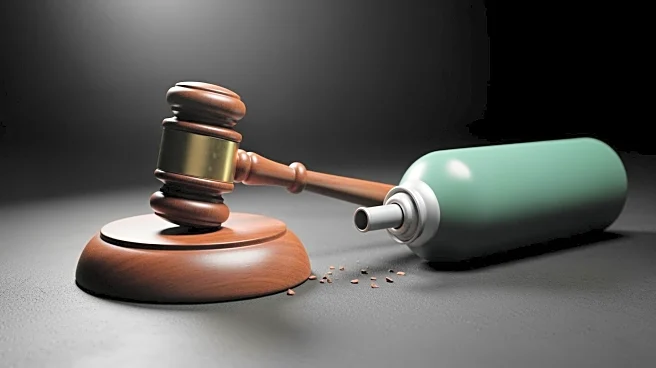What's Happening?
Senior Border Patrol official Gregory Bovino is facing allegations of violating a judge's order by deploying tear gas against protesters in Chicago. The incident occurred during a demonstration against federal immigration authorities in the Little Village
neighborhood. A court filing accuses Bovino of throwing tear gas canisters into the crowd, potentially breaching restrictions set by US District Judge Sara Ellis. The judge's order limits federal agents' use of force during protests, with exceptions for threats to law enforcement. The filing, supported by media groups and clergy members, references a Facebook video showing Bovino's actions. The video does not clarify the events leading up to the incident or any warnings given. Bovino, who leads Border Patrol's El Centro sector, has been involved in similar operations in Los Angeles and Chicago, drawing both criticism and praise for his tactics.
Why It's Important?
The allegations against Bovino highlight ongoing tensions between federal authorities and local communities regarding immigration enforcement. The use of tear gas and other aggressive tactics has sparked widespread criticism and legal challenges. This incident underscores the broader debate over federal intervention in Democrat-led cities, a key aspect of President Trump's law enforcement strategy. The creation of the Illinois Accountability Commission by Governor JB Pritzker aims to document and address federal enforcement abuses, reflecting growing concerns over the impact on local communities. The legal battle over the deployment of National Guard troops in Chicago further complicates the situation, with potential implications for federal-state relations and civil rights.
What's Next?
Judge Ellis has ordered Bovino to be deposed, with a preliminary injunction hearing scheduled for November 5. The court has extended Bovino's deposition time to five hours, indicating the seriousness of the allegations. The Trump administration is urging the Supreme Court to allow the deployment of National Guard troops in Chicago, a decision that could significantly affect federal enforcement strategies. The outcome of these legal proceedings will likely influence future federal actions in cities with strong opposition to such interventions. Stakeholders, including local officials, civil rights groups, and federal agencies, are expected to closely monitor developments.
Beyond the Headlines
The incident raises questions about the ethical and legal dimensions of federal enforcement tactics. The use of force against protesters, particularly in politically charged environments, challenges the balance between maintaining order and respecting civil liberties. The broader implications for community trust in law enforcement and government accountability are significant. As federal actions continue to face scrutiny, the role of oversight bodies like the Illinois Accountability Commission becomes crucial in ensuring transparency and justice.















